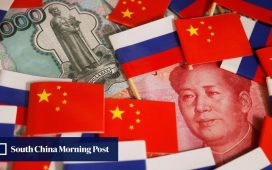In comparison, the government’s month-long public consultation found 98.6 per cent of 13,147 submissions backed the law.
Three protesters gathered outside city government headquarters on February 27, waving a banner with the words: “human rights stand above the regime”, as dozens of police officers looked on. No one was arrested.
Party leader Chan Po-ying said the organisation had remained a frequent target of law enforcement agencies, despite “massively” downscaling its activities since Beijing imposed its own national security law on the city in 2020.
Chan was among three people arrested in December after she attempted to stage a protest against the city’s first “patriots-only” district council poll, which saw the proportion of elected seats reduced from nearly 95 per cent to 19 per cent.
“We will continue to do things that are normal, things that we think are reasonable and legal … We can’t stop just because of this,” she said.
Chan added she did not expect any dramatic political changes under the Article 23 law, but predicted it would create fresh uncertainties on top of what was an already “depressed political climate”.
She said she was concerned about the revised sedition offences as the legislation explicitly ruled that seditious intention does not have to incite violence or public disorder.
The new law instead defined it as inciting hatred or disaffection of public officers of Hong Kong or offices of mainland China’s central authorities in the city. It also covers incitement of hatred or disaffection among city residents.

Chan said another worry was that the law’s clauses on external interference could hinder the political party’s exchanges with overseas organisations.
“We are approaching everything with more caution with more of the so-called self-censorship, which is natural,” she said. “But the question is where the authorities’ line lies? We really don’t know.”
Democratic Party chairman Lo Kin-hei added the Beijing-imposed national security law had already shaken up Hong Kong’s political climate over the last few years and that he did not expect the new legislation would have a material impact on the opposition group.
The political party had played things safe and carried on, he said.
Lo added the Article 23 law’s provisions on external interference was of little concern to the organisation as it had largely severed ties with foreign governments and groups since 2020.
But he advised party members to carefully review their social media posts in light of the revised sedition offences.
“Although we aren’t sure where the [government’s] line lies, we need to check again if we had something dangerous posted before,” he said. “I think we need to do it again as we’d always found something [to remove] in every one of these checks.”

Former opposition district councillor Leticia Wong Man-huen, who now owns the Hunter Bookstore, said the ambiguity caused by the legislation was the biggest issue.
Wong added that, although sedition was not a new crime, she was troubled by the Legislative Council’s debate on the possession of seditious publications. The new legislation will increase the penalty for offenders from a year in prison to three.
She said it would be impractical to check every title at her shop, let alone know which of her books matched the government’s definition of seditious intent.
“Is Animal Farm seditious? Is [Japanese anime] Attack on Titan seditious? Can we talk about Taiwan if we can’t talk about Hong Kong?” Wong asked.
“To be frank, I also want to be a law-abiding citizen, but how can I do it?”
Ryan Mitchell, an associate professor of law at the Chinese University of Hong Kong, said it was highly likely that city courts would mostly handle sedition cases rooted in verbal offences.
Such a trend would help to resolve which forms of expression were considered a breach of national security, he said.
But the academic said the judiciary still had the power to strike a balance between freedom of expression and safeguarding national security.
“Hong Kong’s common law system overall remains robust,” he said.
“This has been demonstrated in national security-related cases as well, where judges have generally demonstrated their impartiality – they have not, for example, granted each and every injunction sought by the government with regards to expression and association.”
Additional reporting by Willa Wu














